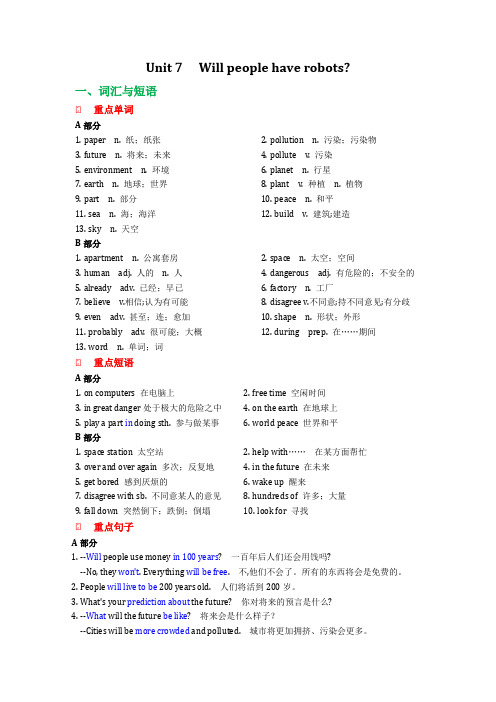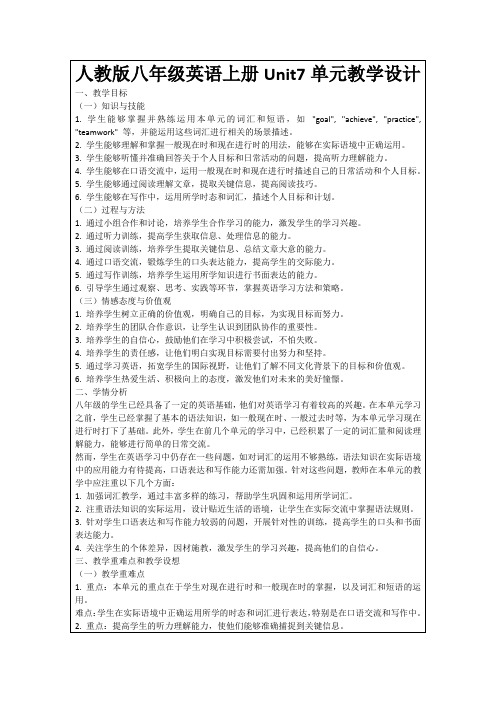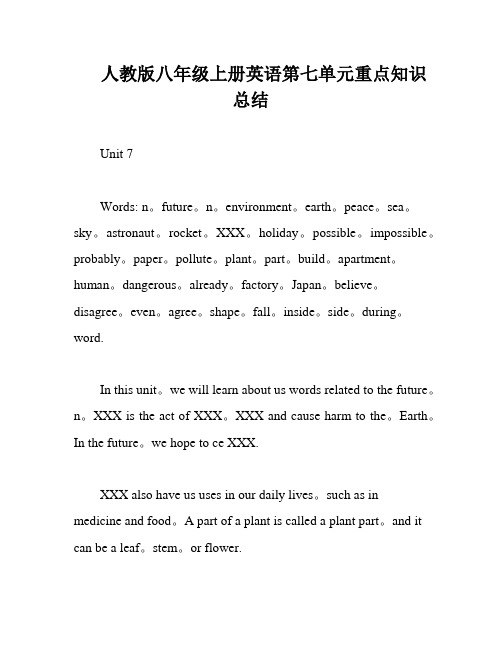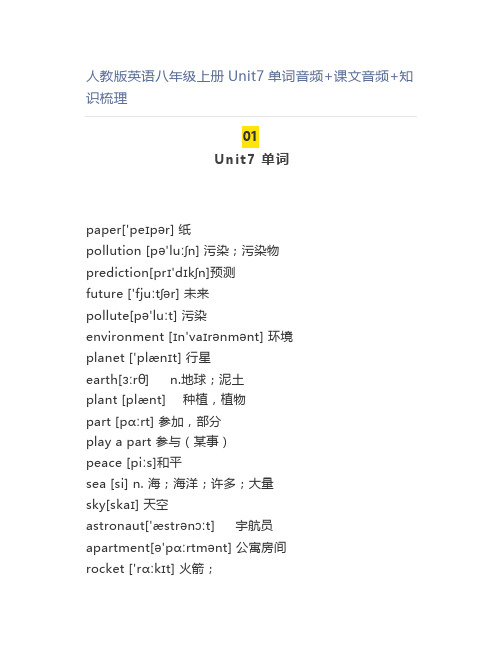人教版英语八年级上册第7单元
人教版八年级上册英语 Unit 7单元知识点总结

人教版八年级上册英语Unit 7单元知识点总结Unit 7 Will people have robots?知识点1. Do you think…? 你认为……?后常接宾语从句,宾语从句要用陈述句的语序。
例:Do you think there will be more pollution in the future?宾语从句特殊疑问词+ do you think+陈述语序2.paper纸不可数名词一张纸a piece of paper报纸,论文,试卷可数名词3. live to be + 年龄= live to +年龄= live the age of + 年龄活到多少岁live to do sth. 为做某事而活着。
后面的不定式表目的。
live v. 第三人称单数lives /liviz/;life n. 复数形式lives /laivz/living adj. 活着的作定语和表语alive adj. 活着的只作表语例:a living man (定语) The man is living (表语,放在be动词后面) The man is alive (表语)4. in 100 years 在100年以后in + 一段时间在……之后一般将来时,对其提问用how soon (多久)5. part n. 参加,参与;部分take part in = join in 参加play a part in sth./ doing sth. 参与到……中去;在……中扮演着……的角色6. human n. 人复数(pl.) humansadj. human being =humanperson 个体的人,有单复数形式,“一个人”只能说“a person”,不能说“a people”。
people 人,人们集体,为一个集合名词;也可作“民族”,此时有单复数,a people 指“一个民族”,所以它的复数就是“peoples”。
最全面人教版八年级上册英语第七单元知识点归纳总结

Unit 7 Will people have robots?一、词汇与短语● 重点单词A部分1.paper n. 纸;纸张2.pollution n. 污染;污染物3.future n. 将来;未来4.pollute v. 污染5.environment n. 环境6.planet n. 行星7.earth n. 地球;世界8.plant v. 种植n. 植物9.part n. 部分10.peace n. 和平11.sea n. 海;海洋12.build v. 建筑;建造13.sky n. 天空B部分1.apartment n. 公寓套房2.space n. 太空;空间3.human adj. 人的n. 人4.dangerous adj. 有危险的;不安全的5.already adv. 已经;早已6.factory n. 工厂7.believe v.相信;认为有可能8.disagree v.不同意;持不同意见;有分歧9.even adv. 甚至;连;愈加10.shape n. 形状;外形11.probably adv. 很可能;大概12.during prep. 在……期间13.word n. 单词;词● 重点短语A部分1.on computers 在电脑上2.free time 空闲时间3.in great danger处于极大的危险之中4.on the earth 在地球上5.play a part in doing sth. 参与做某事6.world peace 世界和平B部分1.space station 太空站2.help with……在某方面帮忙3.over and over again 多次;反复地4.in the future 在未来5.get bored 感到厌烦的6.wake up 醒来7.disagree with sb. 不同意某人的意见8.hundreds of 许多;大量9.fall down 突然倒下;跌倒;倒塌10.look for 寻找● 重点句子A部分1.--Will people use money in 100 years? 一百年后人们还会用饯吗?--No, they won't. Everything will be free. 不,他们不会了。
人教版新目标版八年级英语上册第七单元课件PPT

2
3
1
1d Listen again. Fill in the blanks with the correct verbs in the box.
am lived will be
live took will live
work will fly
1. I ___l_iv_e___ in an apartment across the street from here.
5. In 50 years, people will have __l_es_s___ free time because there will be __m__o_r_e__ things to do.
3b Complete the predictions with what you think will happen.
Q1:What's your job?/ What do you do? Q2:How do you go to work? Q3:Where do you live?
Answer 1: Answer 2: Answer 3:
1c Listen to Alexis and Joe. Number the pictures [1-3].
the week after next 下下周
What will happen 100 years later?
There will be … 将会有……
There will be fewer trees.
There will be less water.
There will be more people.
little 一些的(否定)
less更少的 (修饰不可数名词)(least最少的) water, air, paper, time, pollution, money, coffee
人教版八年级英语上册Unit7单元教学设计

3.阅读作业:阅读与本单元话题相关的文章,完成以下任务:
-总结文章大意。
-列出文章中出现的现在进行时态的句子。
-回答文章后的问题。
-目的:提高学生的阅读理解能力,加强他们对时态的识别和运用。
4.听力作业:完成与本单元相关的听力练习,包括以下内容:
然而,学生在英语学习中仍存在一些问题,如对词汇的运用不够熟练,语法知识在实际语境中的应用能力有待提高,口语表达和写作能力还需加强。针对这些问题,教师在本单元的教学中应注重以下几个方面:
1.加强词汇教学,通过丰富多样的练习,帮助学生巩固和运用所学词汇。
2.注重语法知识的实际运用,设计贴近生活的语境,让学生在实际交流中掌握语法规则。
3.针对学生口语表达和写作能力较弱的问题,开展针对性的训练,提高学生的口头和书面表达能力。
4.关注学生的个体差异,因材施教,激发学生的学习兴趣,提高他们的自信心。
三、教学重难点和教学设想
(一)教学重难点
1.重点:本单元的重点在于学生对现在进行时和一般现在时的掌握,以及词汇和短语的运用。
难点:学生在实际语境中正确运用所学的时态和词汇进行表达,特别是在口语交流和写作中。
-口语练习:学生用现在进行时态和本单元词汇进行角色扮演。
-阅读练习:阅读与本单元话题相关的文章,完成练习题。
-写作练习:学生用现在进行时态和本单元词汇编写一段话。
(五)总结归纳
1.教学活动设计:
-教师引导学生回顾本节课所学内容,总结现在进行时态的用法和本单元词汇。
2.目标:
-帮助学生巩固所学知识,形成知识体系。
-听录音,回答问题。
-根据所听内容,完成表格或图片。
人教版八年级上册英语 Unit 7单元知识点总结

Unit 7 Will people have robots?知识点1. Do you think…?你认为……?后常接宾语从句,宾语从句要用陈述句的语序。
例:Do you think there will be more pollution in the future?宾语从句特殊疑问词+ do you think+陈述语序2. paper纸不可数名词一张纸a piece of paper报纸,论文,试卷可数名词3. live to be + 年龄= live to +年龄= live the age of + 年龄活到多少岁live to do sth. 为做某事而活着。
后面的不定式表目的。
live v. 第三人称单数lives /liviz/;life n. 复数形式lives /laivz/living adj. 活着的作定语和表语alive adj. 活着的只作表语例:a living man (定语) The man is living (表语,放在 be 动词后面) The man is alive (表语)4. in 100 years 在 100 年以后in + 一段时间在……之后一般将来时,对其提问用 how soon (多久)take part in = join in 参加play a part in sth./ doing sth. 参与到……中去;在……中扮演着……的角色6. human n. 人复数(pl.) humansadj. human being =humanperson 个体的人,有单复数形式,“一个人”只能说“a person”,不能说“a people”。
people 人,人们集体,为一个集合名词;也可作“民族”,此时有单复数,a people 指“一个民族”,所以它的复数就是“peoples”。
7. such adj. 这样的such+ a/an+ adj. + 单数可数名词such + adj. + 复数可数名词/不可数名词so adj. so + adj./ adv. + 复数名词/不可数名词so + adj. + a/an + 单数可数名词such + a/an + adj. + 单数可数名词= so + adj. + a/an + 单数可数名词8. It is + adj. + for sb. to do sth. 做某事对某人而言是……此句型中的“it”为形式主语,真正的主语为不定式短语比较 It is + adj. + for sb. to do sth.与 It is + adj. + of sb. to do sth.(这里的形容词是描述事物性质的 ) (这里的形容词是表示人的性格特征或品质,如clever,kind, nice, good,foolish 等)It is + adj. + for sb. to do sth. 句式还可以与动名词作主语的句式相互替换。
人教版八年级上册英语第七单元重点知识总结

人教版八年级上册英语第七单元重点知识总结Unit 7Words: n。
future。
n。
environment。
earth。
peace。
sea。
sky。
astronaut。
rocket。
XXX。
holiday。
possible。
impossible。
probably。
paper。
pollute。
plant。
part。
build。
apartment。
human。
dangerous。
already。
factory。
Japan。
believe。
disagree。
even。
agree。
shape。
fall。
inside。
side。
during。
word.In this unit。
we will learn about us words related to the future。
n。
XXX is the act of XXX。
XXX and cause harm to the。
Earth。
In the future。
we hope to ce XXX.XXX also have us uses in our daily lives。
such as in medicine and food。
A part of a plant is called a plant part。
and it can be a leaf。
stem。
or flower.Building apartments is a common practice in many countries。
but it can also have negative effects on the environment。
For example。
if an apartment is built in a natural habitat。
it can disrupt the ecosystem and harm the plants and animals living there。
人教版英语八年级上册Unit7单词+课文+知识梳理

人教版英语八年级上册Unit7单词音频+课文音频+知识梳理01Unit7 单词paper['peɪpər] 纸pollution [pə'luːʃn] 污染;污染物prediction[prɪ'dɪkʃn]预测future ['fjuːtʃər] 未来pollute[pə'luːt] 污染environment [ɪn'vaɪrənmənt] 环境planet ['plænɪt] 行星earth[ɜːrθ] n.地球;泥土plant [plænt] 种植,植物part [pɑːrt] 参加,部分play a part 参与(某事)peace [piːs]和平sea [si] n. 海;海洋;许多;大量sky[skaɪ] 天空astronaut['æstrənɔːt] 宇航员apartment[ə'pɑːrtmənt] 公寓房间rocket ['rɑːkɪt] 火箭;space[speɪs] .空间;太空space station 太空站human ['hjuːmən] 人的;n.人;人类servant['sɜːrvənt] 仆人dangerous ['deɪndʒərəs] 危险的already[ɔːl'redi]已经factory['fæktri] 工厂over and over again 多次;反复地believe [bɪ'liːv] 相信disagree [ˌdɪsə'ɡriː]不同意even['iːvn] 甚至;愈加hundreds of 许多;大量;成百上千shape [ʃeɪp] 形状fall [fɔːl] 倒塌;跌倒fall dow n 突然倒下;跌倒;倒塌inside ['ɪn'saɪd]n. 里面;内部;内情;内脏adj. 里面的;内部的;秘密的adv. 在里面prep. 少于;在…之内look for 寻找;寻求possible ['pɑːsəbl] 可能的impossible [ɪm'pɑsəbl]adj. 不可能的;不可能存在的;难以忍受的;不真实的n. 不可能;不可能的事side [saɪd]n. 方面;侧面;旁边vi. 支持;赞助;偏袒adj. 旁的,侧的vt. 同意,支持probably ['prɑːbəbli] 大概;或许;很可能during ['dʊrɪŋ] pr ep. 在…的时候,在…的期间holiday ['hɑːlədeɪ] 假日word [wɜːrd] 单词;02U n i t7课文03U n i t7知识梳理【重点短语】1、on computers 在电脑上2、on paper 在纸上3、live to be 200 years old 活到200岁4、free time 空闲时间5、in danger 在危险中6、on the earth 在世界上7、play a part in sth 在某方面出力/做贡献8、space station 太空站8、look for 寻找9、computer programmer 电脑程序师10、in the future 在将来11、hundreds of 成百上千的12、the same…as 与…...一样13、 over and over again 反复14、get bored 无聊15、wake up 醒来/唤醒16、look like 看起来像17、fall down 倒下/落下【重点句型】1. Are you kidding?你开玩笑吧?2. Will people have robots?人们会拥有机器人吗?3. Everything will be free.一切都将是免费的。
人教版八年级英语上册第七单元知识点

人教版八年级英语上册第七单元知识点Unit 7 Will people have robots?一.重点词汇讲解1.paper n. 纸张,纸该词为不可数名词,表示“一张纸”是a piece of paperpaper n. 试卷此时为可数名词2.pollution n. 污染,污染物不可数名词water pollution 水污染air pollution 空气污染pollute v. 污染,玷污polluted adj. 受污染的,被玷污的3.prediction n. 预测,预言predict v. 预测4.environment n. 环境environmental adj. 环境的5.part n. 部分[常见搭配]play a part in sth/doing sth 参与;发挥作用;扮演角色例如:Parents usually play a part in their kids’ decisions.父母经常在孩子做决定这件事情上会发挥作用。
6.space n. 空间,太空[辨析] space & roomspace 指“(个人)空间,太空”时,是不可数名词,指“空地,余地,间隔”时,既可以作不可数名词,也可以作可数名词。
room指为某一目的所需的空间,侧重大小,尺寸等时,是不可数名词。
而指“房间”的含义时,是可数名词。
[注意]表示“空地,空间”时,space 和room可以互换。
7.dangerous adj. 危险的,不安全的safe adj. 安全的danger n. 危险safety n. 安全[常见搭配] be in (great) danger 处于(极大的)危险中8.such adj. & pron. 这样的,如此,这样[辨析] such & sosuch 是形容词,修饰名词。
常见结构有:(1)such +a/an + adj. +单数可数名词+that 从句。
- 1、下载文档前请自行甄别文档内容的完整性,平台不提供额外的编辑、内容补充、找答案等附加服务。
- 2、"仅部分预览"的文档,不可在线预览部分如存在完整性等问题,可反馈申请退款(可完整预览的文档不适用该条件!)。
- 3、如文档侵犯您的权益,请联系客服反馈,我们会尽快为您处理(人工客服工作时间:9:00-18:30)。
上学期第7单元同步验收练习题听力部分(共20分)I. 听单词,判断该词是(√)否(×)含有所给的音素。
(5分)序号音素判断1 /k/2 /s/3 /u/4 /e/5 /n/II. 听句子,选出与其意思相符的图画。
(5分)1. ________2. ________3. ________4. ________5. ________III. 听对话,补全句中所缺的单词。
(5分)M: Hi, Ann, let's make fruit salad.W: OK, Jim. That's a good (1)______. Can you make it?M: Yes, I can.W: How much (2)______do we need?M: Two (3)______.W: How many (4)______do we need?M: Let me see. We need three oranges.W: And how much (5)______do we need?M: One teaspoon.W: Anything else?M: No. Now let's make fruit salad.IV. 听短文,根据其内容选择正确答案。
(5分)1. Some people outside China like to have their tea______.A. with milkB. with nothingC. with milk and sugar2. Chinese people like tea______in it.A. with milkB. with nothingC. with sugar3. People in China eat______.A. more vegetables than meatB. more meat than vegetablesC. more bread than rice4. People in America and in Canada eat ______.A. more vegetables than meatB. more meat than breadC. more vegetables than bread5. ______, some people have cold drinks when they are having supper.A. In ChinaB. In CanadaC. In America笔试部分(共80分)I. 语音与词汇。
(15分)A)从A、B、C、D四个选项中,找出其划线部分与所给单词划线部分读音相同的选项。
(5分)1. bread A. great B. mean C. unhealthy D. idea2. bowl A. how B. window C. flower D. now3. crust A. put B. usually C. lettuce D. cut4. top A. opposite B. cold C. today D. money5. mix A. advice B. holiday C. wild D. illB)根据句意及首字母提示,补全句中所缺的单词。
(5分)6. The word "water" is an u______noun.7. Please add some r______before cooking.8. Mr Li gives the students some i______about the exam.9. Turn on the b______to make orange juice.10. P______the outer before we eat some fruits.C)将下列名词进行分类。
(5分)sauce, foot, milk, honey, yogurt, lake, subway, bowl, meat, teaspoon不可数名词: 11. ____ 12. ____ 13. ____ 14. ____ 15. ____可数名词: 16. ____ 17. ____ 18. ____ 19. ____ 20. ____II. 单项选择。
(10分)21. It's dark (暗的) in the room. Please ______the light.A. turn onB. turn upC. turn downD. turn off22. -______girls are there in your class?-Twenty.A. How oftenB. How farC. How muchD. How many23. Don't______the milk into the cup. It's full.A. peelB. pourC. leaveD. drink24. You can ______ some sugar ______ the water.A. add; /B. add; intoC. add; toD. add up to; /25. -Would you like to drink the smoothie?-______.A. Yes, I'd love toB. No, I'd love toC. Don't ask meD. Sorry, I can't26. There is ______ smoothie in the cup.A. anyB. muchC. a fewD. many27. -The banana is too big.-You can ______ first.A. cut up themB. cut them upC. cut it upD. cut up it28. Do you like lettuce ______ sandwiches?A. ofB. inC. atD. with29. -I'd like to eat ______ bread.-Here you are.A. manyB. aC. a slice ofD. two30. -Let's make fruit salad.-______.A. No, I'm notB. Thank youC. That's all rightD. That's a good ideaIII. 句型转换。
(10分)按要求改写下列各句,每空一词。
31. You can drink some tea. (改为祈使句)______some tea, ______.32. They need one teaspoon of cinnamon. (对划线部分提问)______ ______ cinnamon do they need?33. We like tomatoes. (改为一般疑问句)______ you ______ tomatoes?34. Check your answers again. (改为否定句)______ ______ your answers again.35. The pizza is very delicious. (对划线部分提问)______ do you ______ the pizza?IV. 动词填空。
(15分)用括号内所给动词的适当形式填空。
36. Look! The bus ______ (come).37. He ______(not go) home yesterday afternoon.38. ______ you ______ (find) work in Hefei last year?39. Tom usually ______ (walk) to school.40. The moon ______ (move) round the earth.41. The children ______ (watch) TV at home every evening.42. -What ______ you ______ (do) tomorrow?-Nothing much.43. -Where is Jim?-He ______ (mend) his bike in the garden.44. Alice ______ (write) two letters to her parents last week.45. We ______ (visit) you next Sunday.V. 阅读理解。
(15分)Tea is popular in the world, but more than three hundred years ago most of the people in Europe did not know anything about tea.Once an English doctor came back from China for Christmas holiday. He gave his mother some tea as a present. She told her friends about the present and asked them to come to a "tea party". When her friends came, the old woman took out some tea-leaves and asked them to eat. Of course, nobody liked the tea-leaves.Just at that time the doctor came in. He looked at the table and asked, "Mother, what did you do with the tea?""I boiled it as you said.""And what did you do with the water?""I poured it away, of course." answered the old woman."Now you may throw away the leaves, too."said the doctor.根据短文内容,判断下列句子正(T)、误(F)。
